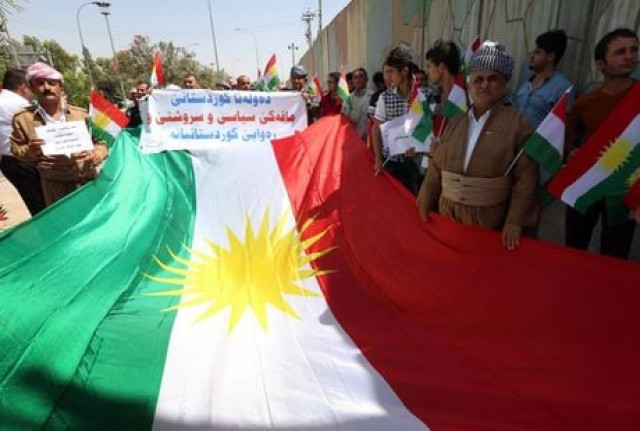Iraq top court declares Kurd referendum unconstitutional
Monday's legal move was the latest stage in a crisis sparked by the referendum

Iraq Supreme Court Orders Suspension of Kurdistan Referendum,PHOTO:AFP
A statement said the court "rendered a decision declaring unconstitutional the referendum held on September 25, 2017 in Iraqi Kurdistan... and cancelling all the consequences and results that resulted".
Monday's legal move was the latest stage in a crisis sparked by the referendum, which resulted in a resounding "yes" vote for independence in the Kurdish area.
Last month, the UN Security Council urged the Iraqi government and regional leaders in Kurdistan to set a timetable for talks to end the crisis.
The world body's appeal came after Baghdad dismissed an offer from Iraqi Kurdish leaders to freeze the outcome of the referendum and hold talks. Rejecting the freeze offer, Iraqi Prime Minister Haider al-Abadi instead demanded the annulment of the independence vote.
Iraqi forces seize oil-city of Kirkuk from Kurds
Last week, as the deadline announced by the Supreme Court for its decision on the constitutionality of the referendum approached, the Kurdistan government said it "respected" the decisions taken by Iraq's highest court. It also said it respected a previous decision insisting on Iraqi unity, which could be a basis for dialogue.
Parliament in Baghdad is currently reviewing the federal budget for the coming year, including the allocation for the autonomous Kurdish region. September's referendum was initiated by then Kurdish leader Massud Barzani, for whom the repercussions were severe.
Barzani at the beginning of November announced he was stepping aside, having lost almost all of the territory disputed between Kurdish capital Arbil and Baghdad.
The Kurds also lost all of the oil resources in Kirkuk province that could have ensured the viability of a hypothetical Kurdish state.



















COMMENTS
Comments are moderated and generally will be posted if they are on-topic and not abusive.
For more information, please see our Comments FAQ